The rise of free eCommerce store platforms has now made it possible for almost anyone to have a fully functioning store page in a matter of hours. We are here to guide you in choosing the best free eCommerce platform for your current business or a future endeavor you might have. There are multiple platforms to choose from, and we will use a few different criteria to look into which one will be best for building your online business. Here are the different criteria we will look at:
- What features the free option provides
- The limitations of the free plan
- The key features of the platform
- Cost of upgrading to a paid version
- Any other significant information
We have included the 6 most popular and best free eCommerce platforms to help you in deciding which one fits your unique business, your target audience, and the required work you are comfortable with. The reason using a free eCommerce platform is important is because there are so many other things that you will have to pay for when setting up your online store. These include such things as; paying for a domain, web hosting, payment processing fees, and possibly inventory and storage.
An important thing to know is that while the majority of these eCommerce platforms will be completely free, one of them will be a free trial to help you in getting your online store off the ground. An added caveat is that there is no such thing as 100% free; these options won’t charge you a monthly or yearly fee, but they will still charge a processing fee on each transaction your business completes on their platform.
1. WooCommerce
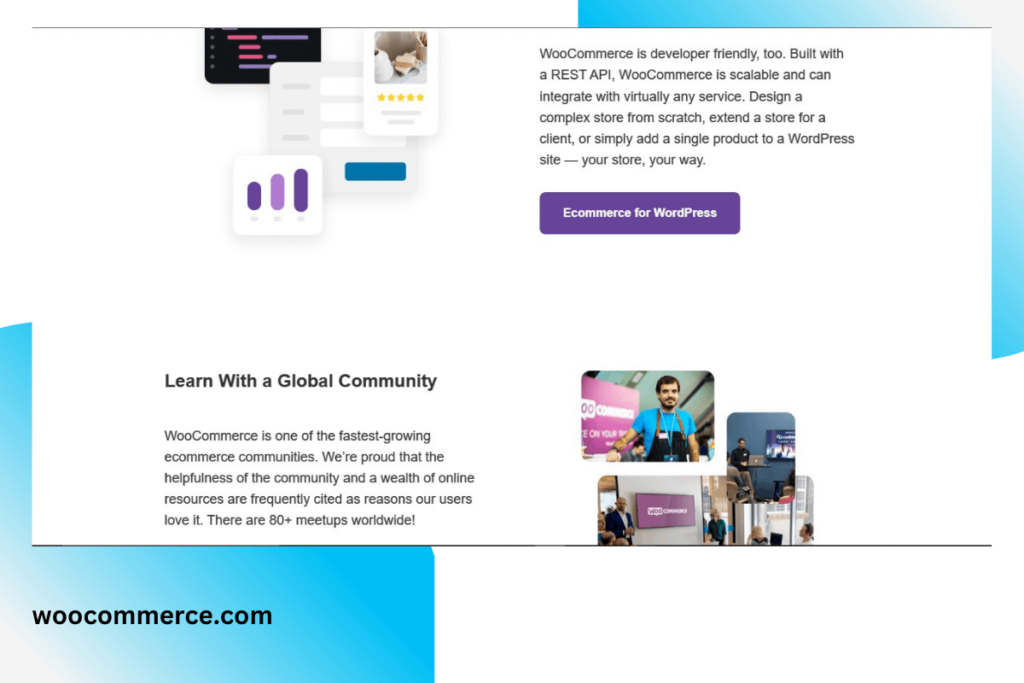
WooCommerce is the most popular eCommerce platform that is free to install. It is different from the other options on this list because it is a WordPress plugin and requires you to download and install the program to use it. With it being an open-source platform, it allows for greater flexibility in your online store’s design but does require the most work to get started. The platform’s best feature is that it is a WordPress plugin, and you are provided more options than you will know what to do with at first when setting up your online storefront. An added cost of this platform is that it does not include any web hosting, and you will need to source that from a 3rd party company.
Pros
- If you are familiar with WordPress, it will be the best option
- No transaction payment fees will be applied by the WooCommerce
- Thousands of plugins are available when setting up with WordPress
- Easy blog integration with your store
- Unlimited products from the beginning
Cons
- The initial plugin is free, but there are other costs in setting up the platform, such as web hosting
- Several key sales features are locked behind paid plugins
- Add-on plugins will eventually add up
- WordPress has a slight learning curve
The most important feature of this eCommerce platform is that it is as customizable as you want to learn to make it. It also can scale with your business by allowing you to sell; physical products, digital downloads, membership plans, affiliate products, or even run a dropshipping store. Finally, it has more than ten payment gateways that include; PayPal, Stripe, Authorize.Net, or their built-in WooCommerce Payments. Through all this, the platform itself does not charge any percentage on transactions.
2. Big Cartel

Big Cartel is an eCommerce platform that specifically caters to artists. Their slogan is “for artists, by artist,” and the service is meant to be used by artists, craftspeople, and other artisans who are looking at having a small online presence. This is the perfect platform for people who make their own products and are looking at selling just a few products. They only serve a small share of the eCommerce market, but they do it better than anyone else, and it shows.
Pros
- The free plan does not include any transaction fees
- Includes helpful prompts and tips when designing your site
- Provides a URL that can be customized as long as it is set up as name.bigcartel.com
- Multiple free customizable themes to match your products
Cons
- 5 product selling limit for free option
- Limited features compared to the paid plans
- Has a fairly steep learning curve
- Only has 2 payment options, Stripe or PayPal
- Designed for a small group of people
Big Cartel aims to do one thing, that is to help artists, and it does it better than all other free eCommerce sites. It includes paid plans that add in extra features like unlimited products, shipment tracking, better mobile app integration, among other things. The available upgrades are monthly subscriptions that cost $9.99 for Platinum, $19.99 for Diamond, and $29.99 for Titanium. If you are an artist or craftsman, there are very few platforms that will work better for you.
3. Weebly
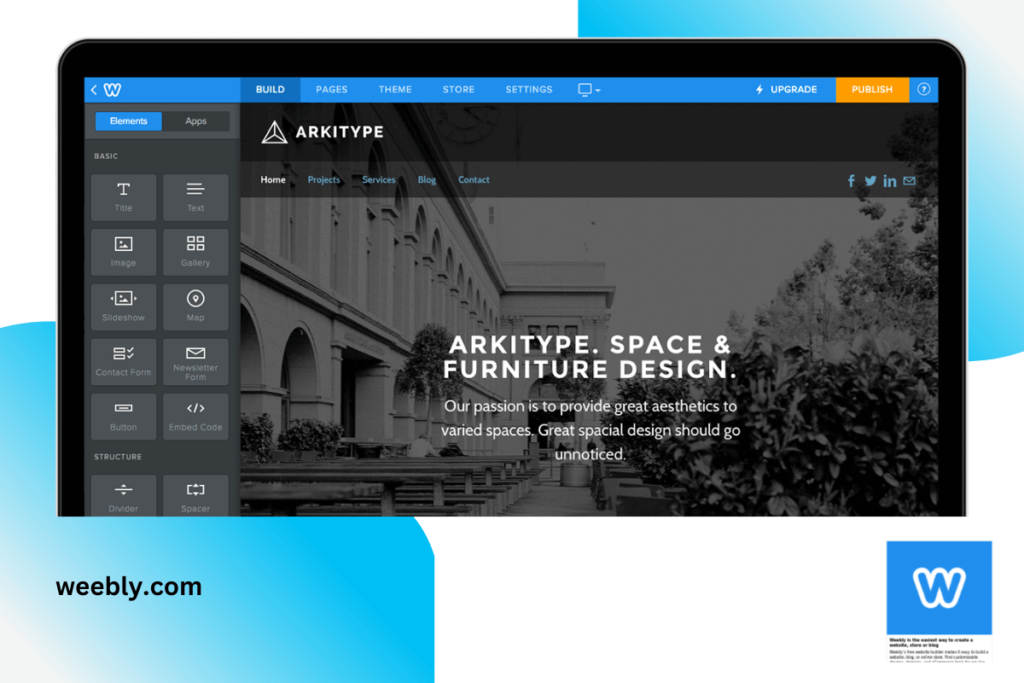
Weebly has always been one of the top paid eCommerce platforms and website builders but only recently started offering a free plan. It offers some of the greatest customizations of any website builder while also being easy to use. All of its eCommerce capabilities are powered by Square, ensuring the platform will be excellent as long as you have a store there. A negative of the free version is that it will display Weebly ads on your business page.
Pros
- Products can be physical or digital
- Very easy to use website building tools
- Over 100 different themes to match the aesthetics of your business
- Includes access to live chat, email, and phone support
- Has built-in shipping, tax management, and inventory features
Cons
- It has a steep 3% transaction fee
- The free plan is limited to just 25 separate products
- Will show ads on your store page
- It does not work well for large businesses
- No multi-channel integration with social media accounts
Weebly has only recently launched its free eCommerce platform, but if you run a small business, this is the site for you. It does have a few drawbacks, such as displaying ads on your business page that can lower the legitimacy of your store. It does offer some of the greatest customizations while also making it as simple as possible. It is recommended to only stay on the free plan for a limited time and eventually upgrade to the $9, $16, or $29 per month plans. Just as with any other subscription plan, if your pay annually, those prices will go down. An important thing to know is that you will still have ads on your page if you subscribe to the $9 a month plan.
4. Constant Contact
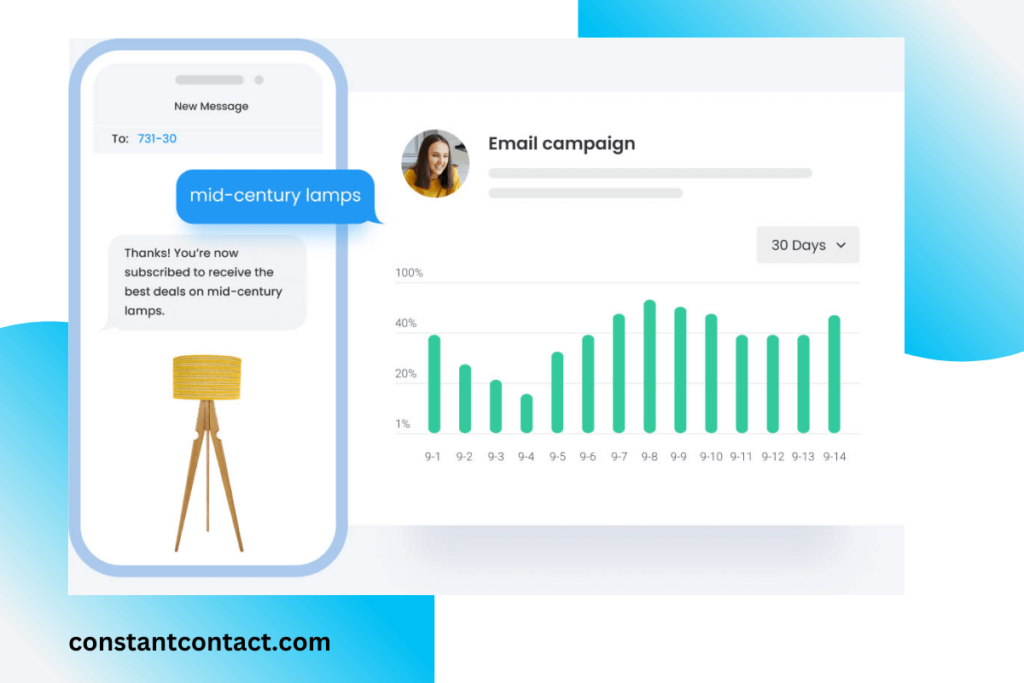
Constant Contact has a free website builder plan that will design and create your site for you. This does cause the options you have to be fairly limited since they do it for you. All you have to do is answer some basic questions about your store and the products you offer. It will be the easiest store to get set up but is also one of the most limited plans on this list. Also, like Weebly, it charges 3% per transaction if you use the free or starter plans.
Pros
- Will design and create the website for you
- Able to sell digital and physical products
- 24/7 support available by email and live chat
- Built-in blogging platform to accompany your store page
- Supports the majority of industry sectors
Cons
- 3% transaction fee
- Limited to 3 products on the free plan
- No multilingual sites, English is the only available option
- Required to us the Constant Contact branded domain name
- It will also include ads on your storefront
This is one of the easiest eCommerce platforms available, but this also limits what can be done with the store. Works hand in hand with WordPress and can be linked directly to your site. It will be best for a small business that has a very limited product catalog and is more interested in selling things on the side. It will also be useful for people starting a side hustle who do not want to spend any extra money. The platform also has one of the best email marketing programs, and it is accessible to the free plan.
5. Square Online
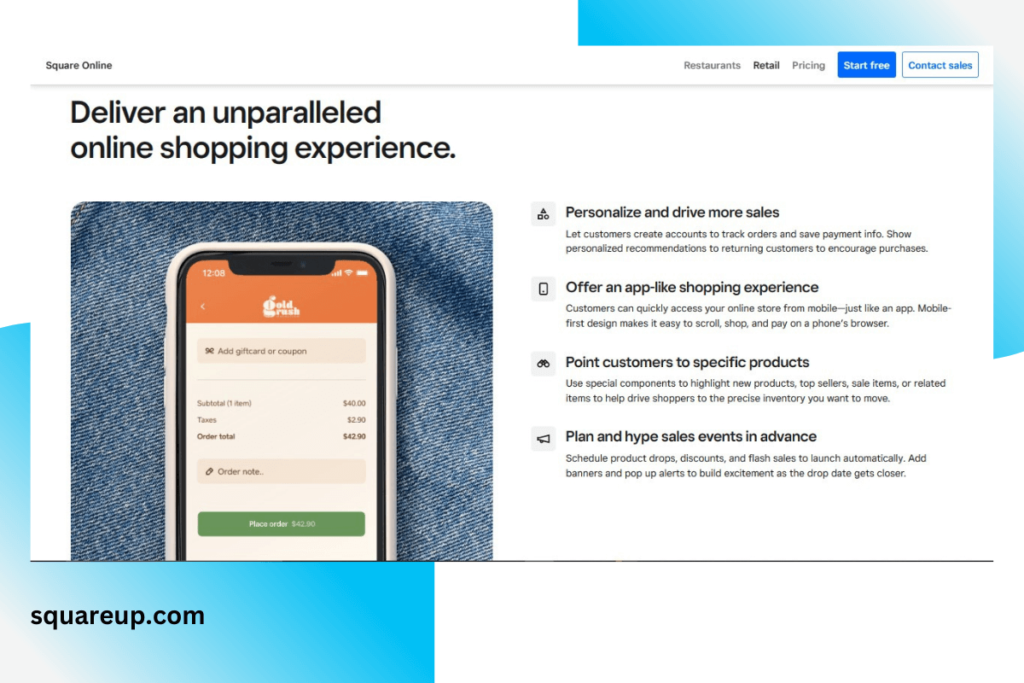
This is the free eCommerce platform that is managed by Weebly’s parent company. Square’s main business is providing tools for small business owners, and they have moved a lot of these on to their online eCommerce platform. Square Online uses ADI (Artificial Design Intelligence) to aid you in designing your store platform. This is very similar to Constant Contact’s assisted design process. This means you have less flexibility when designing your site, but it is much simpler than a fully customizable WordPress platform. This platform is best designed for someone who has a physical store that uses Square and is looking to expand into an online storefront.
Pros
- ADI makes it very easy and quick to set up your store
- Free templates to design your store
- One of the largest business designed to aid small business owners
- Integrates with Square POS for in-person selling and online
- Allows access to Square payment processing, but you can use Stripe or PayPal
- Allows some social media multi-channeling (with Instagram and Pinterest)
Cons
- Transaction fee is 2.9% plus $.30
- Limits the payment options if you don’t want to use there if house options
- Not designed for large scale businesses
- ADI limits the flexibility of the design and theme of your store page
The built-in ADI (Artificial Design Intelligence) is very useful for people who can get overwhelmed by having too many options. However, if you know what you want your store to look like and it isn’t available, then there is nothing you can do. The integrated shopping cart features a shipping and pickup option, an automated tax collector, and provides the option to offer discounts on select items. The paid plans have a range of prices, but they all still include the flat and percentage transaction fee. This platform made our list of the best eCommerce platforms because it is designed for small business owners who are wanting to just dip their toe in the water of online selling.
6. BigCommerce
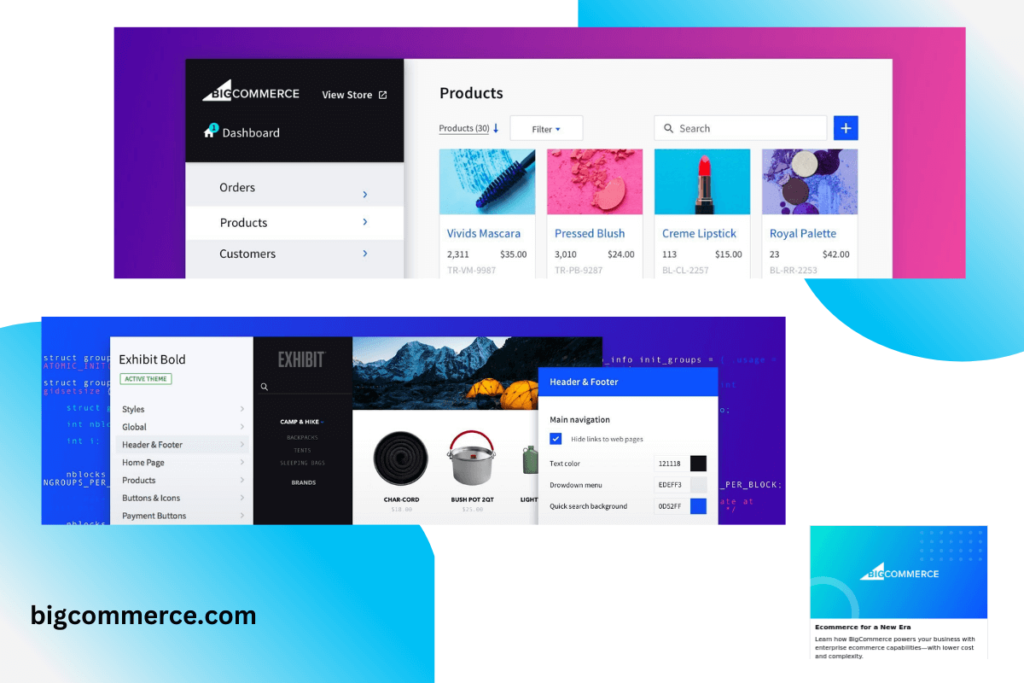
BigCommerce is the best eCommerce platform for large businesses. It is designed to scale as your business grows and will provide the best options for a large business that is looking at starting an online store. It is one of the largest fully hosted eCommerce platforms that even has a WordPress plugin. It was designed so that you would not need to go anywhere else for your online store. This is one of the platforms that don’t have a free plan, but they offer a 15-day free trial to ensure the platform works for your business.
Pros
- Integrate multi-channeling on Facebook and Instagram
- No need to enter your credit card information when setting up the free trial
- Includes a free domain or paid domain names
- Over 6 payment gateways provided
- Some of the best SEO tools to boost site traffic
- An all-in-one platform that provides everything needed to run an online store
Cons
- Only a 15-day trial
- It can be difficult to edit your store once it is created
- It is an all-in-one platform, so you are limited to their add-ons and themes
- No mobile app integration
- The website uses its own complex terminology to describe features
This is by far the best eCommerce platform for big businesses or businesses that want to become big. The free trial is limited to just 15-days which does not provide a lot of time in learning the platform. After the trial ends, it costs $29.95 per month, but you can save 10% by paying annually. While it may appear, this platform doesn’t fit with the others, it has so many more options than all the others. It allows you to sell unlimited products across multiple channels, such as Facebook, eBay, and Amazon. You are given access to 24/7 support that can be reached through live chat or email. This may cost more than others, but it also offers more features and is easier to use than even the paid options of the other eCommerce platforms listed above.
Conclusion
These eCommerce platforms offer the best options while also allowing you to spend money on other areas of your business. The most important thing to remember when choosing one is, do the features match my store’s needs. Are you an artist looking at selling limited products, or are you a large business that already has an established customer base and you are looking at expanding into an online space. All of these options will provide value, it just depends on what you need for your business.
